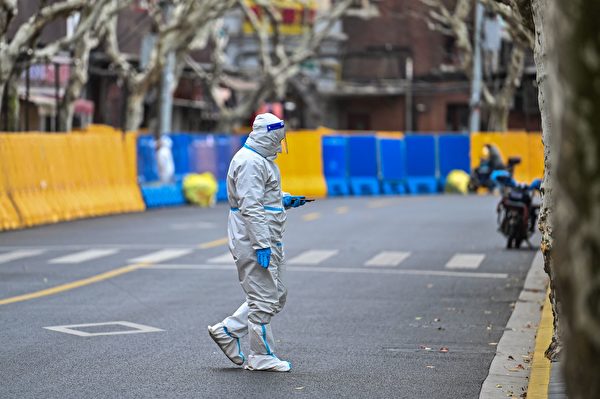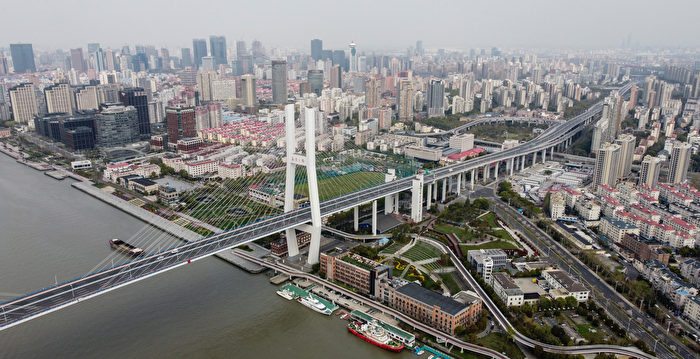[The Epoch Times, April 1, 2022](The Epoch Times reporters Yi Ru, Hong Ning, Lin Cenxin interviewed and reported) Since March, Shenzhen and Shanghai, two first-tier cities in China, have been closed due to the epidemic. Business people in Shanghai said that the losses caused by the closure of the city were catastrophic; business owners with businesses in Shenzhen said that the blockade policy affected supply chain logistics, resulting in delayed shipments, soaring production costs, corporate relocation and serious bankruptcy.
Taiwanese financial expert Huang Shicong analyzed, “If the epidemic in the mainland continues to spread, more and more places will be closed, and even the closure of the city will be longer and longer, which will have an impact on China’s economy this year.”
He said that the CCP’s official media hinted that there may be a possibility of lowering interest rates and reserve ratios in the future, indicating that officials are pessimistic about whether the economic growth target of 5.5% can be achieved this year.
The city’s closure of Shanghai has caused heavy economic losses
According to official data from the Communist Party of China, Shanghai’s gross domestic product (GDP) has ranked first in China for many consecutive years. In terms of divisions, the Pudong New Area with the highest GDP will have a GDP of about 1.5 trillion yuan (RMB, the same below) in 2021. Pudong has become the hardest hit area in this round of epidemic in Shanghai. According to official data, 40% of the 5,653 infected people in the city on March 30 came from Pudong New Area, and many communities have been closed for more than two weeks.
Chen Dong (pseudonym), a business person in Shanghai, said, “Our community has been closed for seven or eight days, some communities have been closed for half a month, and now it will be closed on April 1. All of them do not go to work, the shops are also closed, and the supermarkets are also closed. The market is also closed, and everything is closed.”
Chen Dong lives in Minhang District and is worried about the spread of the epidemic in the city. Pudong, which was originally scheduled to be unblocked on April 1, still can’t solve it, “It definitely can’t be solved, and it will be closed with us (Puxi), it (official) said. If it does, it doesn’t count!” The Shanghai Municipal Government announced on the evening of the 30th that “Shanghai’s global static management” will be lifted on April 5th, I am afraid it is still unknown.
Located in the Pudong New Area and designated by the CCP as a “national strategic economic belt”, the Lujiazui Financial and Economic Zone is home to the East Asian headquarters of many multinational banks. It has been completely “quiet” for a week. There are many nearby residential areas, including Laoshan New Village and Weifang. In Xincun, a serious epidemic is breaking out.
The radio and television towers on both sides of the Huangpu River and the tourist attractions of Nanjing Road Commercial Street have long been empty. Chen Dong said, “Shanghai’s buses and subways have all stopped, and they are not going to work. They have all stopped.” “Pudong and Puxi have all been shut down. At least tens of billions of dollars have been lost. This loss is catastrophic and huge!”
If Shanghai’s total GDP in 2021 is calculated at 4,321.485 billion yuan, the loss of 11.834 billion yuan for one day of closure, and the loss of 83 billion yuan for one week of closure.
Huang Shicong said, “Shanghai is a very important economic artery in China. The entire Chinese financial center is located in Shanghai, and it is also an important export center for goods along the Yangtze River. Once the city is closed, the entry and exit of Shanghai Port will be affected, and the logistics of the entire Chinese industry will be affected.”
Although the official statement said that the operation of Shanghai Yangshan Deepwater Port and Waigaoqiao Port Area will not be affected, according to Caixin.com, drivers refused to leave Shanghai due to the sharp tightening of nucleic acid testing requirements in the port area. , There are fewer and fewer drivers entering the port. Shipping companies said that “the actual operation is already in a semi-paralyzed state”. Some cargo ships have chosen to transfer to Ningbo. At present, the number of cargo ships berthed outside Shanghai and Ningbo ports has increased from 120 in a few days. to 168 ships.
Shenzhen’s epidemic impacted the technology industry and has not recovered
Shenzhen, China’s fourth largest city, also experienced a one-week lockdown from March 14 to 20. After the lockdown was lifted, in the last two days, some areas including Liantang Street in Luohu District, Longhua Street in Longhua District, and Shatou Street in Futian District have been affected by cases of cases. Included in the scope of control.
Li Heng (pseudonym), owner of a joint venture in southern China with operations in Shenzhen, told The Epoch Times that the lockdown measures imposed by the epidemic have had a huge impact on the technology industry, “Most of the chip production and manufacturing are in Shenzhen, and due to Shenzhen’s long-term blockade, the The production and assembly of high-tech electronic products related to chips are affected, and the normal production cycle cannot be carried out for a long time.”
For example, the company recently had a batch of electronic products to be exported to a certain country, but due to the shortage of chips, the original order could be assembled within 1 month, and now it has to wait 6 months before shipment, especially due to the recent impact of the Hong Kong epidemic. “There are often logistical problems. Some chips have to be shipped from Hong Kong before they can be assembled, and now the delivery has been delayed.”
In addition to the electronics industry, Shenzhen is also an assembly and production base for comprehensive industries such as traditional manufacturing and consumer products, Li Heng said. The blockade measures, “directly affect the delivery time of global goods, and are affected by exchange rate fluctuations and prolonged production cycles. Costs have skyrocketed.”
He said that the key node affected by the wave is “logistics”, “the epidemic has caused huge difficulties in the delivery of goods up and down the channels of the Shenzhen factory, even food supply, and the products assembled and distributed from Hong Kong to the mainland are seriously affected by logistics. influence.”
Li Heng said that in the two years since the outbreak of the epidemic in Wuhan, at least 50,000 enterprises in Shenzhen’s manufacturing industry have left, including the previous environmental protection policy. After a month of blockade, the basic wages and benefits of the workers will be paid as they are, and room and board will be arranged. A small and medium-sized enterprise with 50 employees will have to pay hundreds of thousands or even millions of RMB, which is a very high price.”
“There are more and more companies going bankrupt. Many friends around me are shaking their heads and saying: I don’t want to work in Shenzhen anymore, I want to go back to my hometown to work.” He said.
The spread of the clearing storm in many places may lead to people’s hardship
On March 28, the Office of the State-owned Assets Supervision and Administration Commission of the People’s Republic of China issued a measure that “some merchants in medium and high-risk areas can reduce or exempt rent for half a year”.
“This is for shops that borrow state houses. It can give you half a year’s rent reduction or exemption, but some shops on the side of the road that rent ordinary people’s houses will not be reduced by a penny.” Chen Dong said that the loss caused by the closure of the city , the government will ignore it, and seeing media reports of some food delivery or assistance to the elderly, “I saw a lot of them in the video.”

Ms. Zeng, a housing sales agent in Pudong, Shanghai, told reporters that her work was changed to home office, but she couldn’t actually do anything, “There is no business now, it must be affected, it has been a month, and it will start again next month. “Shanghai is now too expensive for supplies. We outsiders have mortgages, rents, food, and living in Shanghai. How can we not survive?”
Li Heng said that in Shenzhen, some foreigners who have no place to stay have been blocked for up to a month. They have no money to pay rent or buy food. It is rumored that there are people who starve to death. Life is in trouble.
In addition to Shanghai and Shenzhen, lockdown measures are spreading in more second-, third-, and fourth-tier cities in China. In some cities that have not yet reported cases, such as Pizhou City, Jiangsu, Mr. Citizen Gu told The Epoch Times that the city has been closed down, and the community is not allowed to enter or leave the community. Nucleic acid testing has been carried out for two consecutive days. Residents in Jincheng, Shanxi also revealed that they have been blocked for a long time, and they have done 7 nucleic acid tests, but not a single case has been reported.
Huang Shicong said that all parts of China have been closing down cities this year, which has had a huge impact on small and medium-sized enterprises. economic goals.”
Responsible editor: Lin Congwen#
